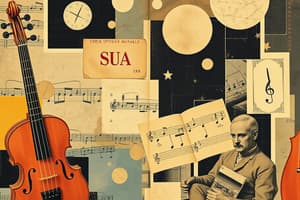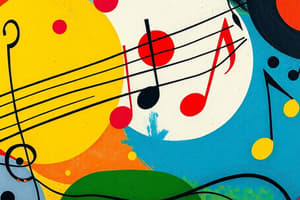Podcast
Questions and Answers
Which musical styles reflect a move away from earlier classical music in the 20th century? (Select all that apply)
Which musical styles reflect a move away from earlier classical music in the 20th century? (Select all that apply)
- Impressionism (correct)
- Modern Nationalism (correct)
- Expressionism (correct)
- Jazz
- Avant Garde Music (correct)
- Neo-Classicism (correct)
Who was the primary exponent of the Impressionist movement?
Who was the primary exponent of the Impressionist movement?
Claude Debussy
What musical composition earned Claude Debussy the top prize Prix de Rome?
What musical composition earned Claude Debussy the top prize Prix de Rome?
Le Enfant prodigue
What is one of Debussy's famous operatic works that received mixed reactions?
What is one of Debussy's famous operatic works that received mixed reactions?
What is the name of Debussy's signature piano work?
What is the name of Debussy's signature piano work?
Which composer is known for his ballet Daphnis et Chloe?
Which composer is known for his ballet Daphnis et Chloe?
Maurice Ravel composed a piece called Bolero.
Maurice Ravel composed a piece called Bolero.
Who developed the twelve-tone system?
Who developed the twelve-tone system?
Expressionism primarily reflects impressions of the environment.
Expressionism primarily reflects impressions of the environment.
What was Arnold Schoenberg's nationality?
What was Arnold Schoenberg's nationality?
What characterizes the compositional style of Ravel? (Select all that apply)
What characterizes the compositional style of Ravel? (Select all that apply)
Flashcards are hidden until you start studying
Study Notes
Musical Styles of the 20th Century
- The early 20th century marked a departure from classical music conventions, introducing distinct styles: Impressionism, Expressionism, Neo-Classicism, Avant-garde music, and Modern Nationalism.
- Influential composers included Claude Debussy, Maurice Ravel, Arnold Schoenberg, Bela Bartok, Igor Stravinsky, Sergei Prokofieff, and George Gershwin.
Impressionism
- Developed in France during the late 19th and early 20th centuries, emphasizing mood and impressions over specific details.
- Characterized by innovative chord progressions, mild dissonances, and a focus on visual imagery.
- Aimed to evoke emotional responses and capture the essence of natural beauty rather than depict reality outright.
Claude Debussy
- Regarded as a pivotal figure in the Impressionist movement, he reshaped musical language through unique approaches to harmony, rhythm, and texture.
- Born on August 22, 1862, in St. Germain-en-Laye, France; began studies at the Paris Conservatory in 1873.
- Won the Prix de Rome for "Le Enfant prodigue."
- Major works include:
- Pelleas et Melisande (1895): Innovative operatic composition.
- La Mer (1905): Atmospheric symphonic portrayal of the sea.
- Notable piano pieces include "Clair de Lune," found in Suite Bergamasque.
- Total compositions approximate 227, encompassing orchestral, chamber music, opera, ballets, and vocal works.
- Died on March 25, 1918, in Paris from cancer, during WWI.
Maurice Ravel
- Born in Ciboure, France, and entered the Paris Conservatory at age 14, studying under Gabriel Faure.
- Known for innovative harmonic styles that were characterized by intricate melodies and rich chords.
- Major works include:
- Daphnis et Chloe (1912): A ballet featuring rhythmic diversity and nature themes.
- La Valse (1920): A waltz with underlying tension.
- Gaspard de la Nuit (1908): Complex piano pieces inspired by poetry.
- Composed about 60 pieces, including piano works, chamber music, songs, ballets, and operas.
- Died in 1937 in Paris.
Expressionism
- Movement sought to express the composer’s inner thoughts and emotions rather than external reality.
- Atonality and the twelve-tone scale were prevalent, diverging from traditional harmonic structures.
- Addressed strong emotions such as anxiety, rage, and alienation.
Arnold Schoenberg
- Born September 13, 1874, in Vienna; taught himself music theory and studied counterpoint.
- Known for a style evolving from traditional tonality to atonality, provoking mixed reactions.
- Developed the twelve-tone system, revolutionary in composing.
- Major works include:
- Verklarte Nacht (1899): One of his earliest successes.
- Pierrot Lunaire: Unique atonal composition.
- Composed approximately 213 works, covering a range from orchestral to choral music.
- Died on July 13, 1951, in Los Angeles, California.
Studying That Suits You
Use AI to generate personalized quizzes and flashcards to suit your learning preferences.




